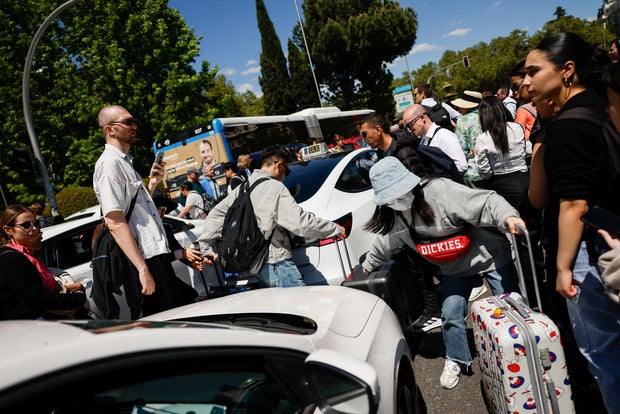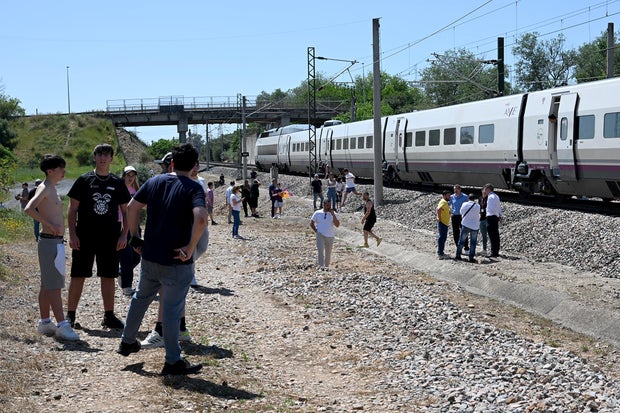A massive, unprecedented power outage hit large parts of Spain as well as Portugal on Monday. The blackout halted subway and railway trains, cut phone service and shut down traffic lights and ATMs for the millions of people who live across Europe’s Iberian Peninsula.
Spanish power distributor Red Eléctrica finally said early Tuesday morning that about 99% of the power capacity had been restored across the country. Monday night, many city residents, including in Spain’s capital of Madrid, went to sleep in total darkness.
The lights also flickered back on Tuesday morning in Portugal’s capital, Lisbon. Portuguese Prime Minister Luis Montenegro had earlier said he expected power to be restored by the end of the day on Monday.
Power outage hits Spain’s and Portugal’s capitals
Offices closed and traffic was snarled as traffic lights stopped working across Madrid on Monday. It was not possible to make calls on many mobile phone networks, though some apps were working. In Barcelona, residents walked into stores searching for battery-powered radios and civilians directed traffic at junctions along the Gran Via avenue that cuts through the city.
Spain’s Prime Minister Pedro Sánchez said that a problem in the European grid that he described as a “strong oscillation” was behind the outage, but that the cause was still being determined. The Spanish leader asked the public to refrain from speculation and said no theory about the cause of the outage had been discarded.
REN, the Portuguese grid operator, said a rare atmospheric phenomenon in Spain from extreme temperature variations was behind the massive outage, according to the Reuters news agency. The Portuguese National Cybersecurity Center issued a statement saying there was no sign the outage was due to a cyberattack.
Red Eléctrica declined to speculate on the causes of the blackout. Eduardo Prieto, head of operations at Red Electrica, told journalists it was unprecedented, calling the event “exceptional and extraordinary.”
Electricity was being pulled from Morocco and France to restore power to southern and northern Spain, Sanchez said, thanking their governments. Spain was also increasing the production from hydroelectric and combined cycle thermal power plants.
Sánchez convened an extraordinary meeting of Spain’s National Security Council and visited Red Eléctrica to follow efforts at restoring grid operations. Montenegro said he has spoken several times to Sánchez. The Portuguese Cabinet convened an emergency meeting at the prime minister’s residence.
Reuters/Susana Vera
The two countries have a combined population of about 60 million people. It was not immediately clear how many were affected. It is rare to have such a widespread outage across the Iberian Peninsula.
Spain’s Canary Islands, Balearic Islands and the territories of Ceuta and Melilla, located across the Mediterranean in Africa, were not impacted by the outage.
The blackout is the second serious European power outage in less than six weeks after a March 20 fire shut down Heathrow Airport in the U.K., and it comes as authorities across Europe gird against sabotage backed by Russia.
A graph on Spain’s electricity network website showing demand across the country indicated a steep drop from around 12:15 p.m. from 27,500 megawatts to nearly 15,000 megawatts. By 7 a.m. local time on Tuesday, Red Eléctrica said the national grid was producing 21.265 megawatts, adding that 99.5% of capacity had been restored.
When the blackout hit on Monday, some people were trapped in elevators, garages and subway tunnels. Almost 300 rescue operations were carried out to free those trapped inside elevators in the Madrid region alone, authorities said.
Spanish airports were forced to operate on backup electrical systems and some flights were delayed, according to Aena, which runs 56 airports in Spain, including Madrid and Barcelona.
In Lisbon, terminals closed and throngs of tourists sat outside in the sun and the shade, waiting for news about their flights.
“We haven’t seen any plane arriving or departing in the 50 minutes we’ve been waiting here,” Dutch tourist Marc Brandsma told The Associated Press.
Train services in both countries ground to a halt. Video aired on Spanish television showed people evacuating metro stations in Madrid and empty stations with trains stopped in Barcelona. Spain’s Transportation Minister Oscar Puente posted on the social platform X that it wouldn’t be possible to restart trains later Monday, even if the power returned.
JAVIER SORIANO/AFP via Getty Images
Play at the Madrid Open tennis tournament was suspended. Three matches were underway when power went down.
Spain’s traffic department asked citizens to avoid using their cars as much as possible due to the power outage, which has affected traffic lights and electrical road signage.
Barcelona’s streets filled with throngs of people on sidewalks, milling about in front of darkened stores and offices and exchanging information on what had happened.
“We are lucky. Some people got trapped in the metro. And there is a positive side: We are talking more with each other,” Monste Cortés said. She said dinner would be sliced bread and cold cuts.
Immediate concerns were which phone companies still had at least some spotty coverage, or where internet access might be found. Another concern was how to get home with the subway shut and public buses packed. Some took advantage of the lack of connectivity and transport to enjoy the sunshine on restaurant terraces.
In Terrassa, an industrial town 30 miles from Barcelona, stores selling generators were out of stock after people lined up to buy them.
Parts of France were also briefly affected, according to Reuters. French grid operator RTE said it was working to provide power to some parts of northern Spain.
In Portugal, a country of some 10.6 million people, the outage hit Lisbon and surrounding areas, as well as northern and southern parts of the country. Portuguese police placed more officers on duty to direct traffic and cope with increased requests for help, including from people trapped in elevators.
Hospitals and other emergency services in both Spain and Portugal switched to generators. Gas stations stopped working.
Portugal’s National Authority for Emergencies and Civil Protection said backup power systems were operating.
Several Lisbon subway cars were evacuated, reports said. Also in Portugal, courts stopped work and ATMs and electronic payment systems were affected.
contributed to this report.


